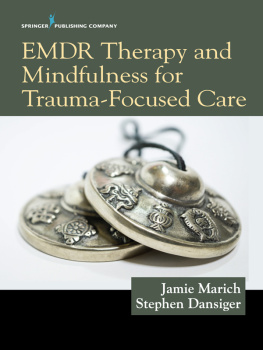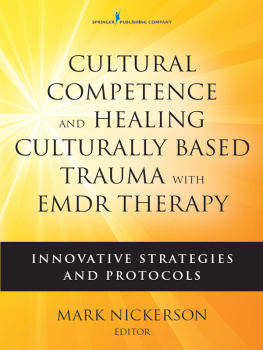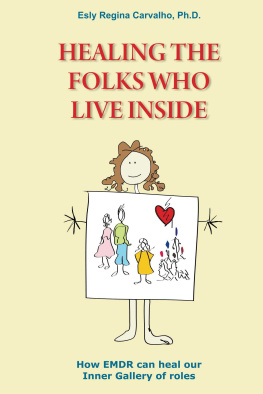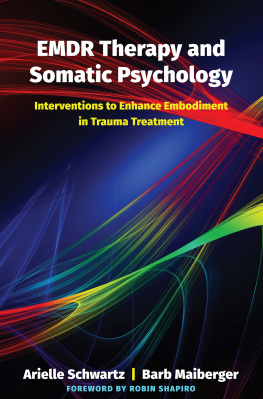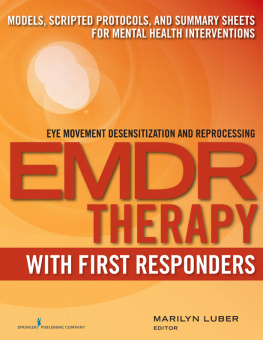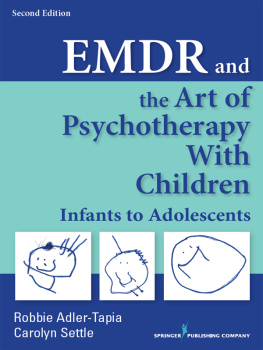Table of Contents
Guide
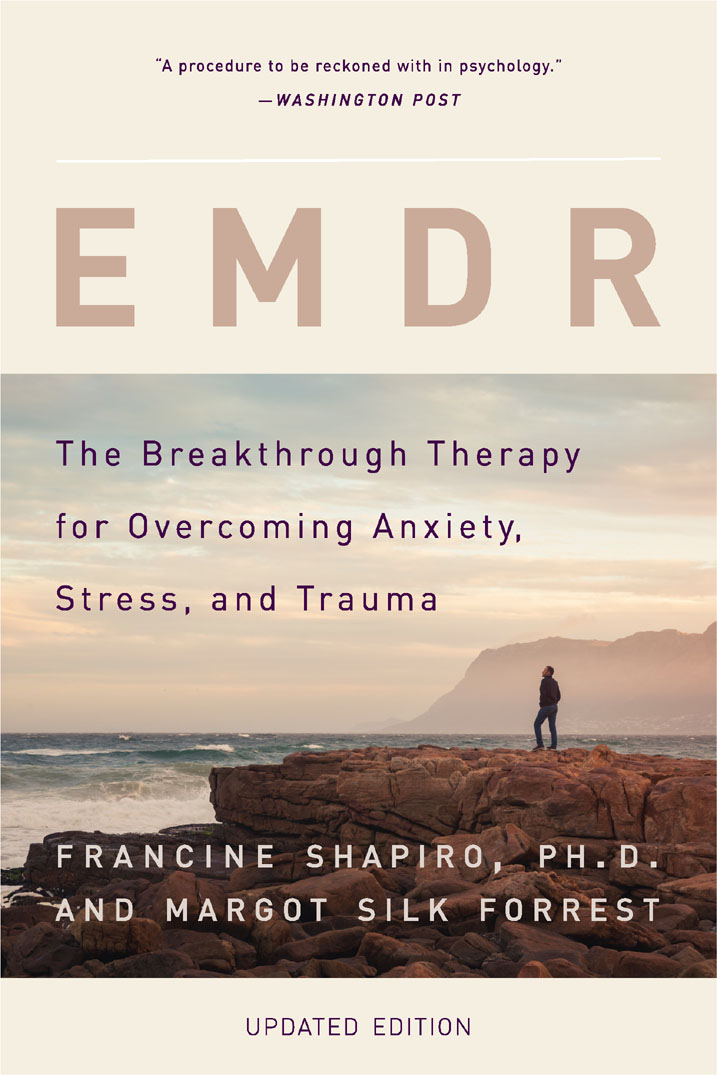

This book was a labor of long duration and many contributors. The content is based on the experiences of hundreds of people, and I hope it has done them justice. Special thanks go to the clients who willingly shared their stories in the hopes that others might be helped. I also wish to gratefully acknowledge the special contributions of the following clinicians: Judy Albert, David Blore, Jac Carlson, Cathy Davis, Nancy Davis, Ron Doctor, Jean Eastman, Sandra Foster, Chad Glang, David Grand, Lew Hamburger, Ad de Jongh, Tim Kaufman, Robert Kitchen, Laura Knutson, Deany Laliotis, Steven Lazrove, Andrew Leeds, Jennifer Lendl, Patti Levin, Howard Lipke, Joan Lovett, Marilyn Luber, Pavel Lushin, John Marquis, David McCann, Daniel Merlis, Gerald Murphy, A. J. Popky, David Price, Gerald Puk, Gary Quinn, Therese Rando, Graciela Rodriquez, Susan Rogers, Curt Rouanzoin, Beverly Schoninger, Elan Shapiro, Jocelyne Shiromoto, Steven Silver, Roger Solomon, Pablo Solvey, Robert Tinker, Sheryll Thompson, Linda Vanderlaan, Rosemary Vienot, Silke Vogelmann-Sine, Donald Weston, Geoffrey White, David Wilson, Sandra Wilson, Carol York, William Zangwill, and Joan Zweben.
As the developer of EMDR, I offer my gratitude to Margot Silk Forrest for her extraordinary writing talents which allowed the stories of suffering and transformation that are described in this book to come alive so vividly. Special thanks to Robbie Dunton for her tireless support. As usual, I couldnt have written this bookor accomplished any creative work throughout the yearwithout her having freed my time and my mind for the task. Many thanks to Robert B. Welch, Steven Lazrove, and Silvia Hines for their special editing efforts, and to MaryAnn Gutoff for her technical assistance. My thanks also to Barb Hensley, Ad de Jong, Susan Brown, and David van den Berg for their research assistance in this latest edition. Writing a book and bringing it to the public is a herculean task. Its success depends upon the input and assistance of many, including an entire publishing staff. For her extraordinary flexibility and skill, my gratitude goes to Quynh Do, my editor at Basic Books. My appreciation to my agent Suzanne Gluck for her multifaceted talents and support. My unending gratitude to all of my friends and colleagues who have joined with me through the years and helped to share the vision. And finally, a special acknowledgment to my parents, Danny and Shirley Shapiro, and to Bob Welch, my husband and oasis.
F. S.
I want to add my heartfelt thanks to my many friends and the courageous staff of The Healing Woman Foundation, all of whom supported me with patience and love during the writing of this book.
M. S. F.
Choosing a Clinician

EMDR is a form of psychotherapy that is recognized worldwide as effective in the treatment of trauma and other disturbing life events. The eight phases of EMDR are designed to ensure that the clients emotions, thoughts, and body reactions evolve into a healthy state (see www.emdr.com/what-is-emdr). There are numerous procedures for each phase and specialized protocols for different problems. The cases you have read in this book were provided by well-trained clinicians using the EMDR reprocessing procedures that have been tested and validated by research. It is important that the clinician you choose does the same.
Make sure that your therapist has taken a course that is approved by the EMDR Association in your region. The organizations below maintain lists that you can use to find a therapist in your geographic area. You should check credentials, since some clinicians may have unknowingly taken substandard training. For instance, in the United States, some training courses being offered are only one-third the length of the approved courses.
EMDR therapy should only be administered by a licensed (or supervised) clinician specifically trained in this form of therapy. Take time to interview prospective clinicians. Make sure that he or she has the appropriate training in EMDR (basic training is a minimum of six full days, with additional supervision) and has kept up with the latest developments. As with any form of therapy, while training is mandatory, it is not sufficient. Choose a clinician who is experienced with EMDR therapy and has a good success rate. Make sure that the clinician is comfortable treating your particular problem. In addition, it is important that you feel a sense of trust and rapport with the clinician. Interview as many as you need to find one who is knowledgeable and feels good to you. Every treatment success is an interaction among clinician, client, and therapy.
Here are five important questions to ask a prospective clinician:
- Have you completed the training approved by the EMDR professional organization (see below)?
- Have you kept informed about the latest protocols and developments?
- Do you use the full eight phases and standard protocol as taught in approved training sessions and as validated by research?
- How many people with my particular problems or disorder have you treated?
- What is your success rate with comparable clients with these problems?
EMDR Therapy and Training Resources, North America


The EMDR Institute has trained over 70,000 clinicians in EMDR therapy since I founded it in 1990. It maintains an international directory of Institute-trained clinicians for client referrals and trains only qualified mental health professionals according to the strictest professional standards. Training authorized by the Institute displays the EMDR Institute logo. It is now one of many training organizations approved by the EMDR International Association (EMDRIA).
For further information on training or a referral, contact the institute by phone: (831) 761-1040; fax: (831) 761-1204; email: .
Soldier Center
Soldier Center is a treatment and training center located near Fort Campbell, Kentucky, and Clarksville, Tennessee. The center specializes in EMDR therapy with military personnel, veterans, and their families. Treatment is available weekly and as five- and ten-day successive day programs. Many referrals from military installations and veteran self-referrals from across the nation utilize the successive-days program. Grants and pro bono services are available for veterans with no resources. Soldier Center also maintains a roster of EMDR-trained clinicians with a military specialty in various parts of the country.
EMDR basic and advanced approved trainings focused on military and veteran issues are provided on-site and as well as contracted with VA/military organizations throughout the United States.
For further information on EMDR training or treatments with veterans or other military, contact Soldier Center by phone: (931) 553-6981; fax: (931) 553-6982; email: .
EMDR International Association
The EMDRIA International Association is a professional organization of EMDR-trained therapists and researchers devoted to promoting the highest possible standards of excellence and integrity in EMDR practice, research, and education for the public good throughout the United States.
Next page


